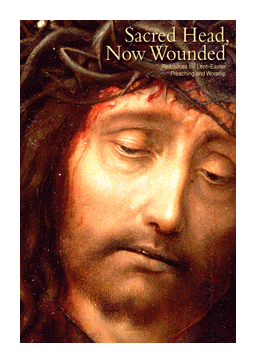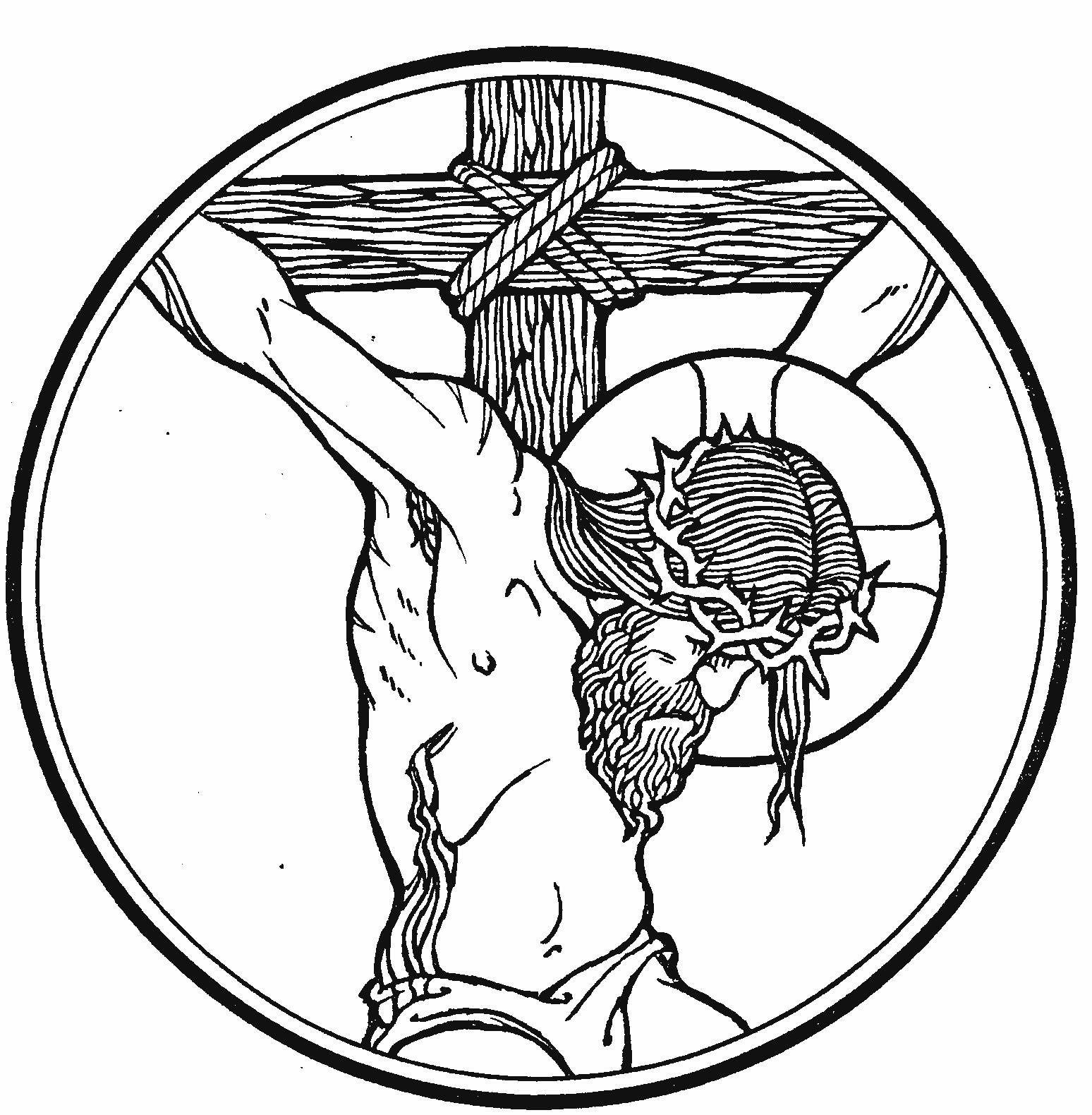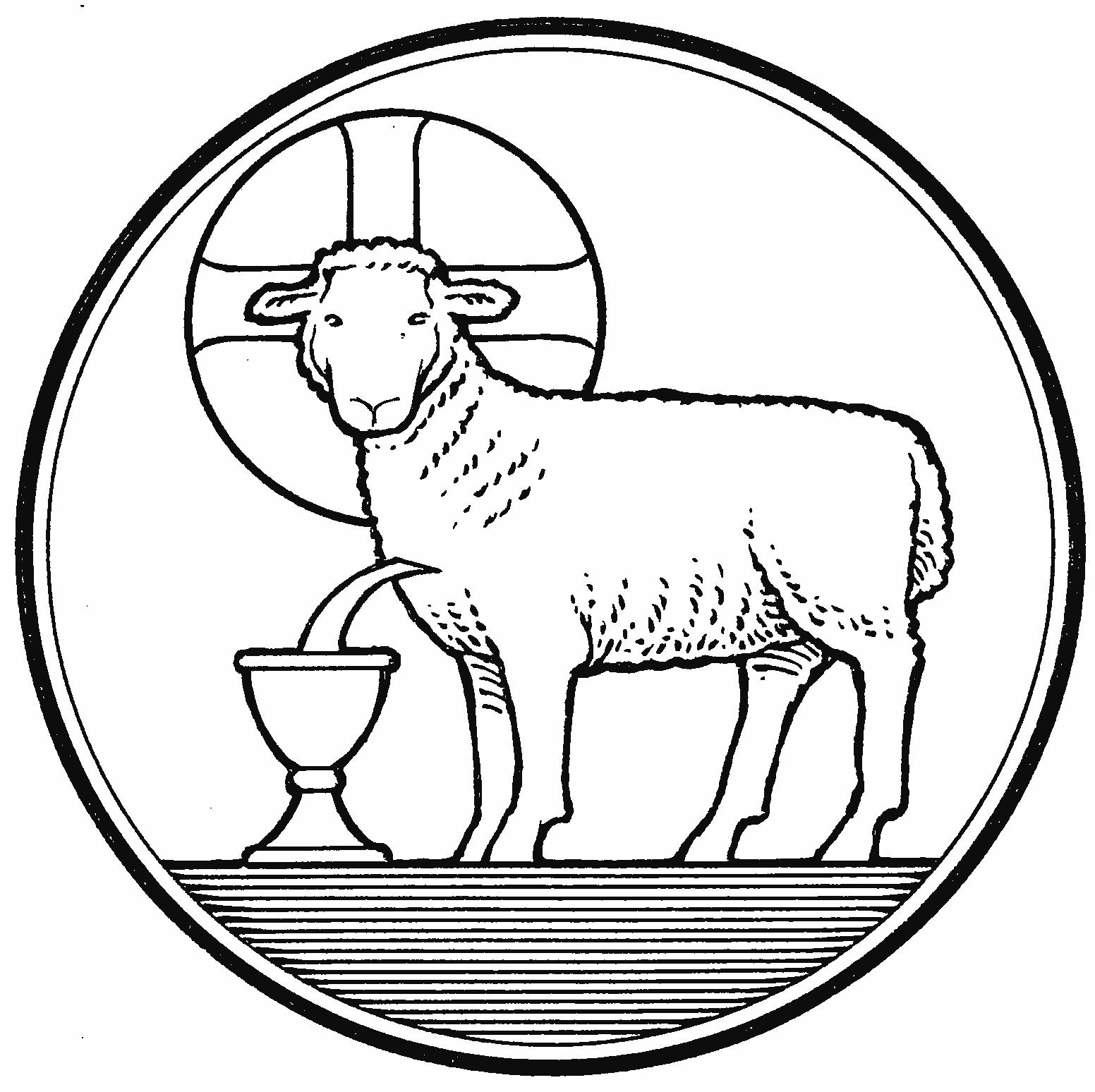Almighty God, through Your only-begotten Son, Jesus Christ, You overcame death and opened to us the gate of everlasting life. We humbly pray that we may live before You in righteousness and purity forever; through the same Jesus Christ, our Lord, who lives and reigns with You and the Holy Spirit, one God, now and forever. Amen.
Category Archives: Church Year
O Sacred Head, Now Wounded
 O sacred Head, now wounded,
O sacred Head, now wounded,
With grief and shame weighed
down,
Now scornfully surrounded
With thorns, Thine only crown.
O sacred Head, what glory,
What bliss, till now was Thine!
Yet, though despised and gory,
I joy to call Thee mine.
How pale Thou art with anguish,
With sore abuse and scorn!
How doth Thy face now languish
That once was bright as morn!
Grim death, with cruel rigor,
Hath robbed Thee of Thy life;
Thus Thou hast lost Thy vigor,
Thy strength, in this sad strife.
What Thou, my Lord, hast suffered
Was all for sinners’ gain;
Mine, mine was the transgression,
But Thine the deadly pain.
Lo, here I fall, my Savior!
’Tis I deserve Thy place;
Look on me with Thy favor,
And grant to me Thy grace.
My Shepherd, now receive me;
My Guardian, own me Thine.
Great blessings Thou didst give me,
O Source of gifts divine.
Thy lips have often fed me
With words of truth and love;
Thy Spirit oft hath led me
To heav’nly joys above.
What language shall I borrow
To thank Thee, dearest Friend,
For this Thy dying sorrow,
Thy pity without end?
O make me Thine forever!
And should I fainting be,
Lord, let me never, never,
Outlive my love for Thee.
My Savior, be Thou near me
When death is at my door;
Then let Thy presence cheer me,
Forsake me nevermore!
When soul and body languish,
O leave me not alone,
But take away mine anguish
By virtue of Thine own!
Be Thou my consolation,
My shield, when I must die;
Remind me of Thy passion
When my last hour draws nigh.
Mine eyes shall then behold Thee,
Upon Thy cross shall dwell,
My heart by faith enfold Thee.
Who dieth thus dies well.
Lutheran Service Book #450
Good Friday
Almighty God, graciously behold this Your family for whom our Lord Jesus Christ was willing to be betrayed and delivered into the hands of sinful men to suffer death upon the cross; through the same Jesus Christ, Your Son, our Lord, who lives and reigns with You and the Holy Spirit, one God, now and forever. Amen.
Maundy Thursday
O Lord, in this wondrous Sacrament You have left us a remembrance of Your passion. Grant that we may so receive the sacred mystery of Your body and blood that the fruits of Your redemption may continually be manifest in us; for You live and reign with the Father and the Holy Spirit, one God, now and forever. Amen.
Ash Wednesday
Dear brothers and sisters of our Lord Jesus Christ, on this day the Church begins a holy season of prayerful and penitential reflections. Our attention is especially directed to the holy sufferings and death of our Lord Jesus Christ.
From ancient times the season of Lent has been kept as a time of special devotion, self-denial, and humble repentance born of a faithful heart that dwells confidently on His Word and draws from it life and hope.
Let us pray that our dear Father in heaven, for the sake of His beloved Son and in the power of His Holy Spirit, might richly bless this Lententide for us so that we may come to Easter with glad hearts and keep the feast in sincerity and truth.
Lutheran Service Book Altar Book, p. 483
A Blessed Reformation
Today we remember the Reformation and what Martin Luther wrote which sparked a change in the Church: Disputation of Doctor Martin Luther on the Power and Efficacy of Indulgences or what we commonly refer to as the 95 Theses. Below are the 95 Theses.
Disputation of Doctor Martin Luther
on the Power and Efficacy of Indulgences
by Dr. Martin Luther (1517) Published in:
Works of Martin Luther:
Adolph Spaeth, L.D. Reed, Henry Eyster Jacobs, et Al., Trans. & Eds.
(Philadelphia: A. J. Holman Company, 1915), Vol.1, pp. 29-38
_______________
Out of love for the truth and the desire to bring it to light, the following propositions will be discussed at Wittenberg, under the presidency of the Reverend Father Martin Luther, Master of Arts and of Sacred Theology, and Lecturer in Ordinary on the same at that place. Wherefore he requests that those who are unable to be present and debate orally with us, may do so by letter.
In the Name our Lord Jesus Christ. Amen.
1. Our Lord and Master Jesus Christ, when He said Poenitentiam agite, willed that the whole life of believers should be repentance.
2. This word cannot be understood to mean sacramental penance, i.e., confession and satisfaction, which is administered by the priests.
3. Yet it means not inward repentance only; nay, there is no inward repentance which does not outwardly work divers mortifications of the flesh.
4. The penalty [of sin], therefore, continues so long as hatred of self continues; for this is the true inward repentance, and continues until our entrance into the kingdom of heaven.
5. The pope does not intend to remit, and cannot remit any penalties other than those which he has imposed either by his own authority or by that of the Canons.
6. The pope cannot remit any guilt, except by declaring that it has been remitted by God and by assenting to God’s remission; though, to be sure, he may grant remission in cases reserved to his judgment. If his right to grant remission in such cases were despised, the guilt would remain entirely unforgiven.
7. God remits guilt to no one whom He does not, at the same time, humble in all things and bring into subjection to His vicar, the priest.
8. The penitential canons are imposed only on the living, and, according to them, nothing should be imposed on the dying.
9. Therefore the Holy Spirit in the pope is kind to us, because in his decrees he always makes exception of the article of death and of necessity.
10. Ignorant and wicked are the doings of those priests who, in the case of the dying, reserve canonical penances for purgatory.
11. This changing of the canonical penalty to the penalty of purgatory is quite evidently one of the tares that were sown while the bishops slept.
12. In former times the canonical penalties were imposed not after, but before absolution, as tests of true contrition.
13. The dying are freed by death from all penalties; they are already dead to canonical rules, and have a right to be released from them.
14. The imperfect health [of soul], that is to say, the imperfect love, of the dying brings with it, of necessity, great fear; and the smaller the love, the greater is the fear.
15. This fear and horror is sufficient of itself alone (to say nothing of other things) to constitute the penalty of purgatory, since it is very near to the horror of despair.
16. Hell, purgatory, and heaven seem to differ as do despair, almost-despair, and the assurance of safety.
17. With souls in purgatory it seems necessary that horror should grow less and love increase.
18. It seems unproved, either by reason or Scripture, that they are outside the state of merit, that is to say, of increasing love.
19. Again, it seems unproved that they, or at least that all of them, are certain or assured of their own blessedness, though we may be quite certain of it.
20. Therefore by “full remission of all penalties” the pope means not actually “of all,” but only of those imposed by himself.
21. Therefore those preachers of indulgences are in error, who say that by the pope’s indulgences a man is freed from every penalty, and saved;
22. Whereas he remits to souls in purgatory no penalty which, according to the canons, they would have had to pay in this life.
23. If it is at all possible to grant to any one the remission of all penalties whatsoever, it is certain that this remission can be granted only to the most perfect, that is, to the very fewest.
24. It must needs be, therefore, that the greater part of the people are deceived by that indiscriminate and highsounding promise of release from penalty.
25. The power which the pope has, in a general way, over purgatory, is just like the power which any bishop or curate has, in a special way, within his own diocese or parish.
26. The pope does well when he grants remission to souls [in purgatory], not by the power of the keys (which he does not possess), but by way of intercession.
27. They preach man who say that so soon as the penny jingles into the money-box, the soul flies out [of purgatory].
28. It is certain that when the penny jingles into the money-box, gain and avarice can be increased, but the result of the intercession of the Church is in the power of God alone.
29. Who knows whether all the souls in purgatory wish to be bought out of it, as in the legend of Sts. Severinus and Paschal.
30. No one is sure that his own contrition is sincere; much less that he has attained full remission.
31. Rare as is the man that is truly penitent, so rare is also the man who truly buys indulgences, i.e., such men are most rare.
32. They will be condemned eternally, together with their teachers, who believe themselves sure of their salvation because they have letters of pardon.
33. Men must be on their guard against those who say that the pope’s pardons are that inestimable gift of God by which man is reconciled to Him;
34. For these “graces of pardon” concern only the penalties of sacramental satisfaction, and these are appointed by man.
35. They preach no Christian doctrine who teach that contrition is not necessary in those who intend to buy souls out of purgatory or to buy confessionalia.
36. Every truly repentant Christian has a right to full remission of penalty and guilt, even without letters of pardon.
37. Every true Christian, whether living or dead, has part in all the blessings of Christ and the Church; and this is granted him by God, even without letters of pardon.
38. Nevertheless, the remission and participation [in the blessings of the Church] which are granted by the pope are in no way to be despised, for they are, as I have said, the declaration of divine remission.
39. It is most difficult, even for the very keenest theologians, at one and the same time to commend to the people the abundance of pardons and [the need of] true contrition.
40. True contrition seeks and loves penalties, but liberal pardons only relax penalties and cause them to be hated, or at least, furnish an occasion [for hating them].
41. Apostolic pardons are to be preached with caution, lest the people may falsely think them preferable to other good works of love.
42. Christians are to be taught that the pope does not intend the buying of pardons to be compared in any way to works of mercy.
43. Christians are to be taught that he who gives to the poor or lends to the needy does a better work than buying pardons;
44. Because love grows by works of love, and man becomes better; but by pardons man does not grow better, only more free from penalty.
45. 45. Christians are to be taught that he who sees a man in need, and passes him by, and gives [his money] for pardons, purchases not the indulgences of the pope, but the indignation of God.
46. Christians are to be taught that unless they have more than they need, they are bound to keep back what is necessary for their own families, and by no means to squander it on pardons.
47. Christians are to be taught that the buying of pardons is a matter of free will, and not of commandment.
48. Christians are to be taught that the pope, in granting pardons, needs, and therefore desires, their devout prayer for him more than the money they bring.
49. Christians are to be taught that the pope’s pardons are useful, if they do not put their trust in them; but altogether harmful, if through them they lose their fear of God.
50. Christians are to be taught that if the pope knew the exactions of the pardon-preachers, he would rather that St. Peter’s church should go to ashes, than that it should be built up with the skin, flesh and bones of his sheep.
51. Christians are to be taught that it would be the pope’s wish, as it is his duty, to give of his own money to very many of those from whom certain hawkers of pardons cajole money, even though the church of St. Peter might have to be sold.
52. The assurance of salvation by letters of pardon is vain, even though the commissary, nay, even though the pope himself, were to stake his soul upon it.
53. They are enemies of Christ and of the pope, who bid the Word of God be altogether silent in some Churches, in order that pardons may be preached in others.
54. Injury is done the Word of God when, in the same sermon, an equal or a longer time is spent on pardons than on this Word.
55. It must be the intention of the pope that if pardons, which are a very small thing, are celebrated with one bell, with single processions and ceremonies, then the Gospel, which is the very greatest thing, should be preached with a hundred bells, a hundred processions, a hundred ceremonies.
56. The “treasures of the Church,” out of which the pope. grants indulgences, are not sufficiently named or known among the people of Christ.
57. That they are not temporal treasures is certainly evident, for many of the vendors do not pour out such treasures so easily, but only gather them.
58. Nor are they the merits of Christ and the Saints, for even without the pope, these always work grace for the inner man, and the cross, death, and hell for the outward man.
59. St. Lawrence said that the treasures of the Church were the Church’s poor, but he spoke according to the usage of the word in his own time.
60. Without rashness we say that the keys of the Church, given by Christ’s merit, are that treasure;
61. For it is clear that for the remission of penalties and of reserved cases, the power of the pope is of itself sufficient.
62. The true treasure of the Church is the Most Holy Gospel of the glory and the grace of God.
63. But this treasure is naturally most odious, for it makes the first to be last.
64. On the other hand, the treasure of indulgences is naturally most acceptable, for it makes the last to be first.
65. Therefore the treasures of the Gospel are nets with which they formerly were wont to fish for men of riches.
66. The treasures of the indulgences are nets with which they now fish for the riches of men.
67. The indulgences which the preachers cry as the “greatest graces” are known to be truly such, in so far as they promote gain.
68. Yet they are in truth the very smallest graces compared with the grace of God and the piety of the Cross.
69. Bishops and curates are bound to admit the commissaries of apostolic pardons, with all reverence.
70. But still more are they bound to strain all their eyes and attend with all their ears, lest these men preach their own dreams instead of the commission of the pope.
71. He who speaks against the truth of apostolic pardons, let him be anathema and accursed!
72. But he who guards against the lust and license of the pardon-preachers, let him be blessed!
73. The pope justly thunders against those who, by any art, contrive the injury of the traffic in pardons.
74. But much more does he intend to thunder against those who use the pretext of pardons to contrive the injury of holy love and truth.
75. To think the papal pardons so great that they could absolve a man even if he had committed an impossible sin and violated the Mother of God — this is madness.
76. We say, on the contrary, that the papal pardons are not able to remove the very least of venial sins, so far as its guilt is concerned.
77. It is said that even St. Peter, if he were now Pope, could not bestow greater graces; this is blasphemy against St. Peter and against the pope.
78. We say, on the contrary, that even the present pope, and any pope at all, has greater graces at his disposal; to wit, the Gospel, powers, gifts of healing, etc., as it is written in I. Corinthians xii.
79. To say that the cross, emblazoned with the papal arms, which is set up [by the preachers of indulgences], is of equal worth with the Cross of Christ, is blasphemy.
80. The bishops, curates and theologians who allow such talk to be spread among the people, will have an account to render.
81. This unbridled preaching of pardons makes it no easy matter, even for learned men, to rescue the reverence due to the pope from slander, or even from the shrewd questionings of the laity.
82. To wit: — “Why does not the pope empty purgatory, for the sake of holy love and of the dire need of the souls that are there, if he redeems an infinite number of souls for the sake of miserable money with which to build a Church? The former reasons would be most just; the latter is most trivial.”
83. Again: — “Why are mortuary and anniversary masses for the dead continued, and why does he not return or permit the withdrawal of the endowments founded on their behalf, since it is wrong to pray for the redeemed?”
84. Again: — “What is this new piety of God and the pope, that for money they allow a man who is impious and their enemy to buy out of purgatory the pious soul of a friend of God, and do not rather, because of that pious and beloved soul’s own need, free it for pure love’s sake?”
85. Again: — “Why are the penitential canons long since in actual fact and through disuse abrogated and dead, now satisfied by the granting of indulgences, as though they were still alive and in force?”
86. Again: — “Why does not the pope, whose wealth is to-day greater than the riches of the richest, build just this one church of St. Peter with his own money, rather than with the money of poor believers?”
87. Again: — “What is it that the pope remits, and what participation does he grant to those who, by perfect contrition, have a right to full remission and participation?”
88. Again: — “What greater blessing could come to the Church than if the pope were to do a hundred times a day what he now does once, and bestow on every believer these remissions and participations?”
89. “Since the pope, by his pardons, seeks the salvation of souls rather than money, why does he suspend the indulgences and pardons granted heretofore, since these have equal efficacy?”
90. To repress these arguments and scruples of the laity by force alone, and not to resolve them by giving reasons, is to expose the Church and the pope to the ridicule of their enemies, and to make Christians unhappy.
91. If, therefore, pardons were preached according to the spirit and mind of the pope, all these doubts would be readily resolved; nay, they would not exist.
92. Away, then, with all those prophets who say to the people of Christ, “Peace, peace,” and there is no peace!
93. Blessed be all those prophets who say to the people of Christ, “Cross, cross,” and there is no cross!
94. Christians are to be exhorted that they be diligent in following Christ, their Head, through penalties, deaths, and hell;
95. And thus be confident of entering into heaven rather through many tribulations, than through the assurance of peace.
Good Friday thoughts
Good Friday may have originally been called “God’s Friday,” but it is certainly also “good” because of the good gifts Christ won for us on this day. Good Friday is not observed as a funeral for Christ, but as a day for repentance over sin and restrained joy and praise for the redemption Christ accomplished for us on the cross.
The services of Holy Week are tied together and best viewed as one worship service. Therefore as you enter the sanctuary you will notice the candles are lit and there is no Invocation or Benediction.
In the service of “Tenebrae” (darkness) candles are extinguished to symbolize our Lord’s descent into death for our sins. The harsh sound (called “Strepitus” in Latin) has a variety of interpretations, including the scourging by the soldiers, the earthquake at the moment of Christ’s death, or the closing of the tomb.
One must not attend a Tenebrae service without also returning to celebrate the victory of Christ on Easter morning; else we remain in our sadness, unsure of our victory in Jesus. The forces of hell do not and shall not prevail against the Light of Christ. His resurrection is sure. He lives eternally. And we, too, shall live!
(From Trinity Lutheran Church, Gillette, WY Good Friday Tenebrae service)
Maundy Thursday thoughts
Holy Thursday, occurring on the eve of our Lord’s crucifixion, culminates the Lenten period of preparation for Christ’s Passion and Resurrection, and is a service of restrained joy. The Service of Corporate Confession and Absolution signals the end of the Lenten preparations with the absolution and peace of Christ. The Service of the Word focuses upon Christ’s sacrificial service demonstrated in His washing of His disciples’ feet, a servanthood enacted on the cross and whose benefits are bestowed in His means of grace. The service culminates with the Lord’s ministry to His people through the Sacrament of the Altar. The depth of Christ’s servanthood is demonstrated as the altar is reverently stripped in preparation for the Church’s observance of Jesus’ death on Good Friday.
During this Lenten season we have heard our Lord’s call to intensify our struggle against sin, death, and the devil – all that prevents us from trusting in God and loving each other. Since it is our intention to receive the Holy Supper of our Lord Jesus Christ on this night when He instituted this blessed meal for our salvation, it is proper that we complete our Lenten discipline by diligently examining ourselves, as St. Paul urges us to do. This holy Sacrament has been instituted for the special comfort of those who are troubled because of their sin and who humbly confess their sins, fear God’s wrath, and hunger and thirst for righteousness.
But when we examine our hearts and consciences, we find nothing in us but sin and death, from which we are incapable of delivering ourselves. Therefore, our Lord, Jesus Christ has had mercy on us. For our benefit He became man so that He might fulfill for us the whole will and law of God and, to deliver us, took upon Himself our sin and the punishment we deserve. So that we may more confidently believe this and be strengthened in the faith and in holy living, our Lord Jesus Christ took bread, broke it, and gave it to His disciples and said: “Take, eat; this is My body, which is given for you.” It is as if He said, “I became man, and all that I do and suffer is for your good. As a pledge of this, I give you My body to eat.”
In the same way also He took the cup, gave thanks, and gave it to them, saying: “Drink of it, all of you; this cup is the new testament in My blood, which is shed for you for the forgiveness of sins.” Again, it is as if He said, “I have had mercy on you by taking into Myself all your iniquities. I give Myself into death, shedding My blood to obtain grace and forgiveness of sins, and to comfort and establish the new testament, which gives forgiveness and everlasting salvation. As a pledge of this, I give you My blood to drink.”
Therefore, whoever eats this bread and drinks this cup, confidently believing this Word and promise of Christ, dwells in Christ and Christ in him and has eternal life.
We should also do this in remembrance of Him, showing His death – that He was delivered for our offenses and raised for our justification. Giving Him our most heartfelt thanks, we take up our cross and follow Him and, according to His commandment, love one another as He has loved us. As our Lord on this night exemplified this love by washing His disciples’ feet, so we by our words and actions serve one another in love. For we are all one bread and one body, even as we are all partakers of this one bread and drink from the one cup. For just as the one cup is filled with wine of many grapes and one bread made from countless grains, so also we, being many, are one body in Christ. Because of Him, we love one another, not only in word, but in deed and in truth.
May the almighty and merciful God and Father of our Lord Jesus Christ, by His Holy Spirit, accomplish this in us.
(From Trinity Lutheran Church, Gillette, WY Maundy Thursday service)
Reflections from Ash Wednesday
I know that Ash Wednesday was yesterday. Needless to say, I was a bit busy with things to get anything posted.
As we were doing the imposition of ashes before the service, it was asked to a lady who was making a mad dash into the sanctuary whether or not she wanted ashes. Her reply: “Yeah, sure, I guess, why not.” For me, I was bothered by this. What kind of reply is that? You came to church for Ash Wednesday, yet could really care less whether or not you had ashes. Do you not know why we do ashes for Ash Wednesday? Here is an excerpt from our bulletin from Ash Wednesday.
Ash Wednesday in the life of the church is a solemn occasion when the people of God remember and contemplate the depth of humanity’s sin. On this day we wear the mark of human frailty and mortality as we are marked with the sign of the cross with ashes upon our foreheads. To dust and ashes we shall return. Just as we are mindful of our sin, this liturgy thrusts us into a vital remembrance of our Baptism, through which God has cleansed us from sin, marked us as His redeemed children, and granted us unmerited immortality.
May God grant us all His blessings during this Lententide.





